ISLAMABAD, Dec 24: The government ruled out on Wednesday the possibility of allowing India to conduct a ‘surgical strike’ inside Pakistan.
Winding up a discussion on national security in the Senate, Leader of the House, Mian Raza Rabbani, rejected as baseless rumours that US Chief of Staff Michael Mullen had advised Pakistan not to retaliate in case of a strategic strike inside its territory and that Pakistan had agreed to allow a single strike. “We were neither conveyed such a message by Mullen nor are we ready to accept such an advice.”
Senator Rabbani said Pakistan would neither allow a surgical strike nor violation of its airspace or other territorial limits.
He asserted that a surgical strike would be treated as war and repulsed with full force.
He said any attempt to alter the boundaries of the country would be thwarted with the support of the masses. He said the civilian and military leadership, as well as the entire nation, were reading from the same page, singing in the same tune and speaking the same language.
“Pakistan is a peaceful country but is ready to give a befitting response if war is thrust on it.”
Reiterating Islamabad’s offer of cooperation in investigation into the Mumbai attacks, he said Pakistan was ready to prosecute any of its nationals against whom evidence was provided by India, but no one would be handed over to New Delhi.
Earlier, senators voiced concern over reports that Admiral Mullen had sought Pakistan’s acquiescence in a secret plan that would allow India to carry out surgical strikes inside Pakistan without meeting any resistance.
They urged the government not to accept any pressure and to take inspiration from the massive public support and launch a diplomatic offensive in response to the hype created by India.
Senator Nisar Memon of Pakistan Muslim League-Q said the government should impose economic sanctions on India by halting all kinds of trade and also disallow Indian exports to Afghanistan via Pakistan.
He said India should be reminded that Pakistan was a responsible nuclear state and its desire for peace should not be construed as a sign of weakness.
He said the Senate should pass a resolution urging the government to order the armed forces to immediately respond to any violation of the country’s borders and airspace.
Senator Memon said India had already violated Pakistan’s airspace and launched a diplomatic war. He also advised the government to start civil defence preparations.
Senator Ishaq Dar of the PML-N said the government should refrain from giving statements or taking decisions in panic and said it should respond to India on the diplomatic front also.
He said irresponsible attitude of the Indian media had fanned tension.
He said the Indian foreign minister and other officials had been naming Ajmal Kasab but they had not been able to identify nine other terrorists who were killed during the attacks.
Ishaq Dar urged the government to implement a resolution on national security and the operation in the tribal areas passed by a joint sitting of both houses of parliament in October and to adopt an effective strategy to tackle terrorism.
He said the world powers had not been able to reconcile themselves to a Muslim country having nuclear capability.
Senator S.M. Zafar said the Indian government had not provided any concrete evidence about involvement of any Pakistani national in the Mumbai attacks during the past month.
He said there was no extradition treaty between the two countries.
The Kashmir issue was a major cause of tension between the two countries and India saw the Mumbai fallout as the best opportunity since partition to attack Pakistan. He said unnecessary aggression on the part of Indian rulers would push their nation into war.
Chaudhry Anwar Bhindar of the PML-Q said the US had said Saudi nationals were involved in the 9/11 attack, but it had never blamed the Saudi government for them, while now it was pointing the finger at Pakistan for the Mumbai carnage.
He said Indian leaders should stop the blame game. Otherwise the Pakistan government should also respond to the allegations in then same tone.Dr Khalid Soomro of the Jamiat Ulema-i-Islam (F) criticised the ban on welfare organisations like Al Rasheed and Al Akhtar trusts.
He called for an investigation into reports that the government had asked China not to veto a resolution in the UN Security Council seeking sanctions on Jamaatud Dawa.
He said all political parties should unite to face the security threat and play their role for the country’s defence.
He suggested the government should call a meeting of Muslim countries and activate its envoys to tackle the diplomatic war launched by India.
Prof Sajid Mir urged the government to reply forcefully to India’s diplomatic offensive.
He criticised the defence minister for declaring that Pakistan would not use nuclear weapons in case of a war and said all options should be kept open to guard against threats to the country’s security.
Maulana Abdul Ghafoor Haideri said that, being nuclear powers, Pakistan and India could not afford a war and all issues should be resolved through dialogue.
He said the violation of Pakistan’s airspace by India should have been raised at the international level.
The Leader of the Opposition, Kamil Ali Agha, urged the government to intensify diplomatic efforts to counter Indian propaganda. He said the UN Security Council resolutions on Kashmir should be implemented.
Maulana Rahat Hussain said it was necessary to improve the law and order situation to thwart foreign aggression.
Rehana Yahya Baloch said India was involved in terrorist activities in Balochistan and the matter should be highlighted.
Kausar Perveen suggested that a meeting of the Organisation of Islamic Conference should be held in another country to ponder over the situation.
Pari Gul Agha accused India of levelling allegations at the behest of the United States.
Bibi Yasmeen Shah scorned the government’s readiness to send the Inter-Services Intelligence director-general to India.















































